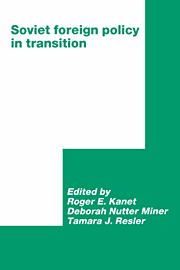Book contents
- Frontmatter
- Contents
- List of tables
- List of contributors
- Preface
- Introduction
- Part I The Soviet Union and the international political system
- Part II The Soviet Union and Europe
- Part III The Soviet Union and the developing world: global trends
- Part IV The Soviet Union and the developing world: regional and country case studies
- Part V Conclusion
- 15 The paradox in new political thinking in Soviet foreign policy
- Index
15 - The paradox in new political thinking in Soviet foreign policy
Published online by Cambridge University Press: 05 February 2012
- Frontmatter
- Contents
- List of tables
- List of contributors
- Preface
- Introduction
- Part I The Soviet Union and the international political system
- Part II The Soviet Union and Europe
- Part III The Soviet Union and the developing world: global trends
- Part IV The Soviet Union and the developing world: regional and country case studies
- Part V Conclusion
- 15 The paradox in new political thinking in Soviet foreign policy
- Index
Summary
The rise of new political thinking in Soviet foreign policy has been both a blessing and a curse. While it has created warmer relations with many countries and has enhanced global security, the radical change in policy also has alienated some traditional Soviet allies and even has exacerbated domestic unrest in the Soviet Union. Not every region of the world has welcomed the changes in Soviet foreign policy during the first five years of Gorbachev's tenure. Many countries have benefited from the new, deideologized interstate relations based on mutual benefit, but others find those changes threatening. The revolutionary transformation in the East European countries reflects the most profound shifts in Soviet foreign policy. And the West European countries, and especially the Nordic states, have profited from the Soviet Union's desire to be an architect of the common European home. But for several traditional Soviet allies in the Third World, such as the Indochinese countries, new political thinking means a loss of financial and military support from the Soviet Union and a threat to their hard-line regimes.
The consequences of the changes in Soviet foreign policy, however, have not been limited to foreign relations. New political thinking has unleashed some forces, primarily in Eastern Europe, that have served as a catalyst to domestic discontent in the Soviet Union. The freedom given to the East European countries in particular has fueled the desire for independence in some of the Soviet republics, especially in the Baltic.
- Type
- Chapter
- Information
- Soviet Foreign Policy in Transition , pp. 299 - 305Publisher: Cambridge University PressPrint publication year: 1992

